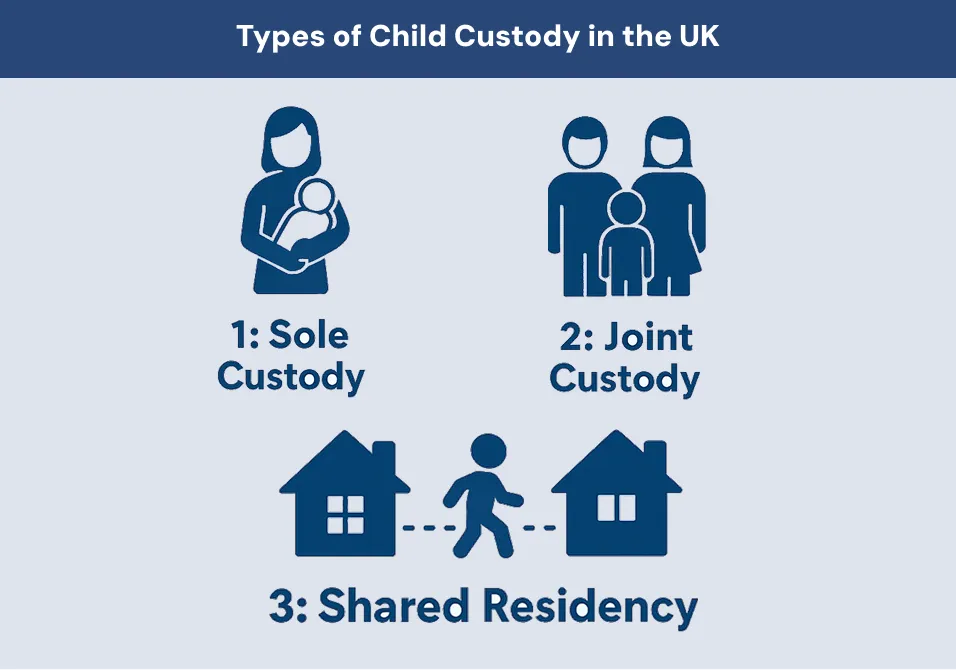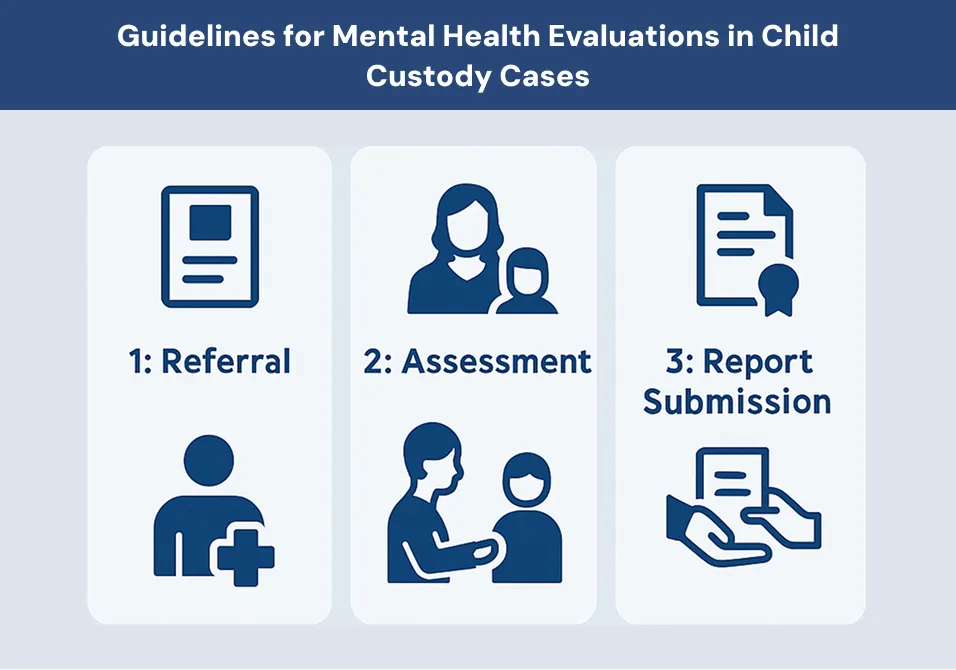TABLE OF CONTENT
Child custody can feel like a turning point when a parent has mental health issues. In UK family courts the main concern is whether the child will have a safe and steady life. Judges look at how a parent manages their condition, keeps up with treatment, and builds a calm daily routine at home. Understanding this lets a parent take real steps and show the court they can be the steady person the child needs.
“When a court determines any question with respect to—
(a) the upbringing of a child; or
(b)the administration of a child’s property or the application of any income arising from it,
the child’s welfare shall be the court’s paramount consideration.”
Children Act 1989, s. 1(1)
A vital point in this judgment is the connection of mental health and child custody. Parents with emotional or mental health challenges may face stricter reviews. This is to make sure the child grows up in a safe and healthy space.
Types of Child Custody in the UK
In the UK, child custody is legally called a “Child Arrangements Order”. The Children Act 1989 provides guidance for these orders, and family courts conduct reviews of them.
There are a few types of custody:
1. Sole Custody
One parent takes full legal and physical custody. The other may get limited or supervised contact.
2. Joint Custody
Both parents share care and decisions. Courts only approve this if both parents are emotionally stable.
4. Shared Residency
The child lives with each parent for set times. Guardians need to be collaborative for this to function smoothly.

The Role of Mental Health in Custody Cases
Mental health matters greatly in custody decisions. Courts assess the impact of emotional disorders on parenting skills. These can include:
- Depression
- Anxiety
- Bipolar disorder
- PTSD
The emotional state of a parent influences how safely their child remains. Non-resolution of issues may result in both supervised visits and restricted parent rights.
What is a Child Custody Mental Health Evaluation?
Psychologists perform this complete evaluation as their professional competency. It checks:
- How stable the parent is
- How they handle stress and care
- Any risks to the child’s safety
Courts order this test when they suspect a parent’s mental health may affect parenting. This is common in family law child custody cases.
How Family Law Protects Children
The family law child custody system focuses on child welfare. Children obtain safeguarding through the Children Act 1989 especially when safeguarding becomes necessary against parental guardianship. The Mental Health Act 1983 (MHA 1983) supports this process. The act provides step-by-step guidance regarding mental condition evaluation and treatment of affected individuals. If a parent is detained or getting care under the MHA 1983, the court sees this as an important factor in custody decisions.
Together, the Children Act and MHA 1983 allow courts to:
- Provide help from social workers or therapists so parents get the support they need
- Ask a psychologist to check a parent’s mental health and report on their parenting skills
- Set up counselling sessions or support groups to help families handle stress and challenges
- Reduce visit times or require supervised contact when a child’s safety might be at risk
- Take steps to move a child to a safer place if a parent’s illness poses a real danger
The regulations exist to ensure children grow up in secure domestic surroundings. The child’s best welfare stands as the main objective.
Re S [2013] EWCA Civ 1146 Case
In Re S the Court of Appeal looked at a mother who had a serious mental illness. Her condition made it unsafe for her to care for her children alone. The children were placed in foster care. She was allowed visits only when someone watched and only after she stuck to her treatment and showed steady change. The judges focused on her health and what kept the children safe.
How to Get Child Custody with Mental Health Support
Having mental health needs does not stop you from trying to get custody. You can improve your chances by showing the court that you are working on your health and that your home is a steady place for a child. Here are practical steps to take:
1. Diagnosis and Care
Go to a doctor or therapist and get a clear diagnosis. Follow the plan they give you. Attend every appointment and take any medicine as told. Keep copies of visit notes and treatment plans. This shows the court you are trying and staying on track.
2. Skill Building
Learn better ways to care for your child by joining a simple class or support group. Use easy tools to calm yourself like slow breathing or a short walk when you feel stressed. Being steady and calm helps when you are with your child.
3. Record Keeping
Write down every doctor visit, therapy session, and any course you finish. Keep all papers, reports, and certificates together. This makes it easy to show the court you have kept up with your steps and have made progress.
4. Safe Home Environment
Keep your home clean and quiet. Set regular times for meals, homework, and sleep. Make the place safe and predictable for a child. A calm and organized home lets the court see that you can give a child a stable life.
By doing this, you show the court you are capable, committed, and safe.
Guidelines for Mental Health Evaluations in Child Custody Cases
These evaluations follow clear legal steps:
Step 1: Referral
Usually, a social worker, family member, or the court makes the referral.
Step 2: Assessment
The professional assesses:
- Parent’s mental health history and treatment records
- Parent–child family dynamics and home environment
- Parent’s daily care skills and parenting ability
Step 3: Report Submission
The expert writes a detailed report about the parent’s mental health assessment, family relationships, and parenting capacity. This report is used by:
- Family court judges review report findings
- Custody lawyers use evidence in hearings
- Social services teams plan child support measures
They use the report to decide how to award or change custody rights.

How Mental Health Affects Parental Rights in Child Custody
Parents with a record of mental illness are not automatically denied custody. But the court will consider:
- Potential risk of serious harm to the child’s safety
- Stability of the home environment and routines
- Consistency of parents ongoing treatment
To gain or retain custody, the parent must:
- Show regular treatment attendance records
- Follow all doctor’s medical advice
- Create a calm, safe space for the child
- Join accredited parenting support programs
This shows they are fit for custody, even with past problems.
Read more about mental health and Guardianship decisions.
Mental Health and Child Protection
When mental health and child custody intersect with child protection, things get more serious. Last year, the number of children taken into care fell by 3% to a record low of 430, but parents’ mental health remains a key driver of interventions. So, if a child faces harm due to a parent’s condition, social services may intervene.
In such cases:
- Child custody mental health assessments of parents are fast-tracked
- Cognitive and emotional tests of parents are done
- The child may be temporarily removed from parents supervision for safety
What do social services need to show the court to remove a child because of a mental health condition?
Social services must show these key points to the court:
- The parent’s mental health is so serious they can’t care for their child safely, even with family or professional help.
- The parent refuses to follow treatment or work with support services needed for safe care.
- A mother’s chaotic or risky lifestyle during pregnancy could harm her unborn baby.
Legal Rights During Mental Health Evaluations
Both children and parents have rights in this process:
- Children have a right to be heard
- Parents have the right to take part in the process
- All findings are confidential and shared only with the court
These legal protections ensure fairness while protecting children from harm.
Why Mental Health Is Key in Child Custody Decisions
Mental health and child custody are closely linked in UK law. A parent’s emotional state can either strengthen or weaken their case. But with the right support, therapy, and legal help, many parents succeed.
Whether you are facing a mental health evaluation in a custody case or trying to understand how to get custody, know that the law prioritises the child’s safety above all.
Need Expert Help?
At Concise Medico, we provide expert medico-legal assessments and reports ready for court. Whether it’s a mental health evaluation or support in a custody battle, we are here to help.
Contact us for expert support with your custody case.
FAQs
Child custody can feel like a turning point when a parent has mental health issues. In UK family courts the main concern is whether the child will have a safe and steady life. Judges look at how a parent manages their condition, keeps up with treatment, and builds a calm daily routine at home. Understanding this lets a parent take real steps and show the court they can be the steady person the child needs.
“When a court determines any question with respect to—
(a) the upbringing of a child; or
(b)the administration of a child’s property or the application of any income arising from it,
the child’s welfare shall be the court’s paramount consideration.”
Children Act 1989, s. 1(1)
A vital point in this judgment is the connection of mental health and child custody. Parents with emotional or mental health challenges may face stricter reviews. This is to make sure the child grows up in a safe and healthy space.
Types of Child Custody in the UK
In the UK, child custody is legally called a “Child Arrangements Order”. The Children Act 1989 provides guidance for these orders, and family courts conduct reviews of them.
There are a few types of custody:
1. Sole Custody
One parent takes full legal and physical custody. The other may get limited or supervised contact.
2. Joint Custody
Both parents share care and decisions. Courts only approve this if both parents are emotionally stable.
4. Shared Residency
The child lives with each parent for set times. Guardians need to be collaborative for this to function smoothly.

The Role of Mental Health in Custody Cases
Mental health matters greatly in custody decisions. Courts assess the impact of emotional disorders on parenting skills. These can include:
- Depression
- Anxiety
- Bipolar disorder
- PTSD
The emotional state of a parent influences how safely their child remains. Non-resolution of issues may result in both supervised visits and restricted parent rights.
What is a Child Custody Mental Health Evaluation?
Psychologists perform this complete evaluation as their professional competency. It checks:
- How stable the parent is
- How they handle stress and care
- Any risks to the child’s safety
Courts order this test when they suspect a parent’s mental health may affect parenting. This is common in family law child custody cases.
How Family Law Protects Children
The family law child custody system focuses on child welfare. Children obtain safeguarding through the Children Act 1989 especially when safeguarding becomes necessary against parental guardianship. The Mental Health Act 1983 (MHA 1983) supports this process. The act provides step-by-step guidance regarding mental condition evaluation and treatment of affected individuals. If a parent is detained or getting care under the MHA 1983, the court sees this as an important factor in custody decisions.
Together, the Children Act and MHA 1983 allow courts to:
- Provide help from social workers or therapists so parents get the support they need
- Ask a psychologist to check a parent’s mental health and report on their parenting skills
- Set up counselling sessions or support groups to help families handle stress and challenges
- Reduce visit times or require supervised contact when a child’s safety might be at risk
- Take steps to move a child to a safer place if a parent’s illness poses a real danger
The regulations exist to ensure children grow up in secure domestic surroundings. The child’s best welfare stands as the main objective.
Re S [2013] EWCA Civ 1146 Case
In Re S the Court of Appeal looked at a mother who had a serious mental illness. Her condition made it unsafe for her to care for her children alone. The children were placed in foster care. She was allowed visits only when someone watched and only after she stuck to her treatment and showed steady change. The judges focused on her health and what kept the children safe.
How to Get Child Custody with Mental Health Support
Having mental health needs does not stop you from trying to get custody. You can improve your chances by showing the court that you are working on your health and that your home is a steady place for a child. Here are practical steps to take:
1. Diagnosis and Care
Go to a doctor or therapist and get a clear diagnosis. Follow the plan they give you. Attend every appointment and take any medicine as told. Keep copies of visit notes and treatment plans. This shows the court you are trying and staying on track.
2. Skill Building
Learn better ways to care for your child by joining a simple class or support group. Use easy tools to calm yourself like slow breathing or a short walk when you feel stressed. Being steady and calm helps when you are with your child.
3. Record Keeping
Write down every doctor visit, therapy session, and any course you finish. Keep all papers, reports, and certificates together. This makes it easy to show the court you have kept up with your steps and have made progress.
4. Safe Home Environment
Keep your home clean and quiet. Set regular times for meals, homework, and sleep. Make the place safe and predictable for a child. A calm and organized home lets the court see that you can give a child a stable life.
By doing this, you show the court you are capable, committed, and safe.
Guidelines for Mental Health Evaluations in Child Custody Cases
These evaluations follow clear legal steps:
Step 1: Referral
Usually, a social worker, family member, or the court makes the referral.
Step 2: Assessment
The professional assesses:
- Parent’s mental health history and treatment records
- Parent–child family dynamics and home environment
- Parent’s daily care skills and parenting ability
Step 3: Report Submission
The expert writes a detailed report about the parent’s mental health assessment, family relationships, and parenting capacity. This report is used by:
- Family court judges review report findings
- Custody lawyers use evidence in hearings
- Social services teams plan child support measures
They use the report to decide how to award or change custody rights.

How Mental Health Affects Parental Rights in Child Custody
Parents with a record of mental illness are not automatically denied custody. But the court will consider:
- Potential risk of serious harm to the child’s safety
- Stability of the home environment and routines
- Consistency of parents ongoing treatment
To gain or retain custody, the parent must:
- Show regular treatment attendance records
- Follow all doctor’s medical advice
- Create a calm, safe space for the child
- Join accredited parenting support programs
This shows they are fit for custody, even with past problems.
Read more about mental health and Guardianship decisions.
Mental Health and Child Protection
When mental health and child custody intersect with child protection, things get more serious. Last year, the number of children taken into care fell by 3% to a record low of 430, but parents’ mental health remains a key driver of interventions. So, if a child faces harm due to a parent’s condition, social services may intervene.
In such cases:
- Child custody mental health assessments of parents are fast-tracked
- Cognitive and emotional tests of parents are done
- The child may be temporarily removed from parents supervision for safety
What do social services need to show the court to remove a child because of a mental health condition?
Social services must show these key points to the court:
- The parent’s mental health is so serious they can’t care for their child safely, even with family or professional help.
- The parent refuses to follow treatment or work with support services needed for safe care.
- A mother’s chaotic or risky lifestyle during pregnancy could harm her unborn baby.
Legal Rights During Mental Health Evaluations
Both children and parents have rights in this process:
- Children have a right to be heard
- Parents have the right to take part in the process
- All findings are confidential and shared only with the court
These legal protections ensure fairness while protecting children from harm.
Why Mental Health Is Key in Child Custody Decisions
Mental health and child custody are closely linked in UK law. A parent’s emotional state can either strengthen or weaken their case. But with the right support, therapy, and legal help, many parents succeed.
Whether you are facing a mental health evaluation in a custody case or trying to understand how to get custody, know that the law prioritises the child’s safety above all.
Need Expert Help?
At Concise Medico, we provide expert medico-legal assessments and reports ready for court. Whether it’s a mental health evaluation or support in a custody battle, we are here to help.
Contact us for expert support with your custody case.




